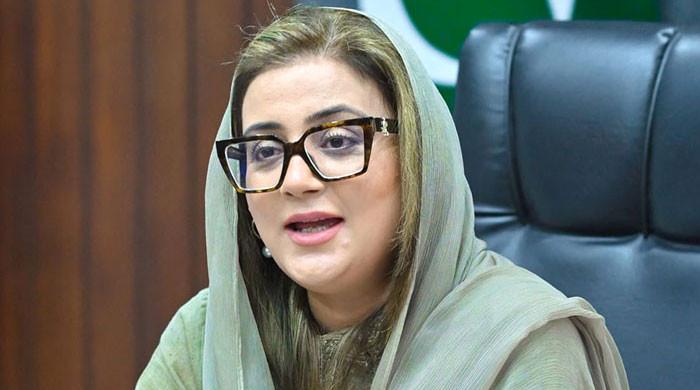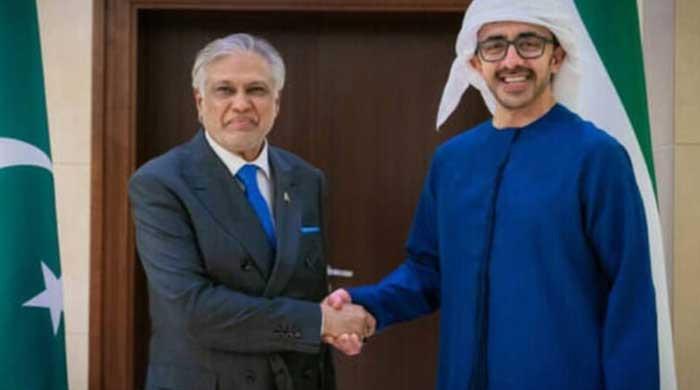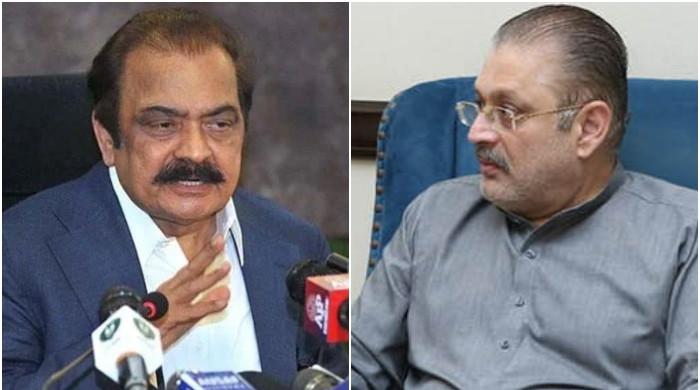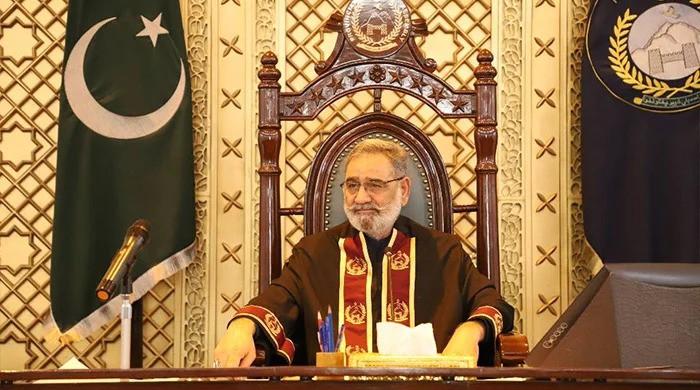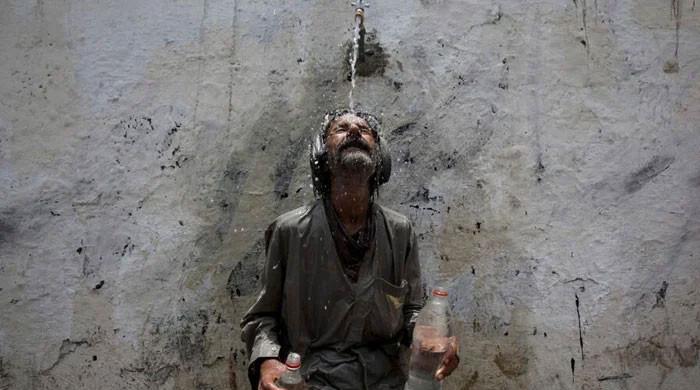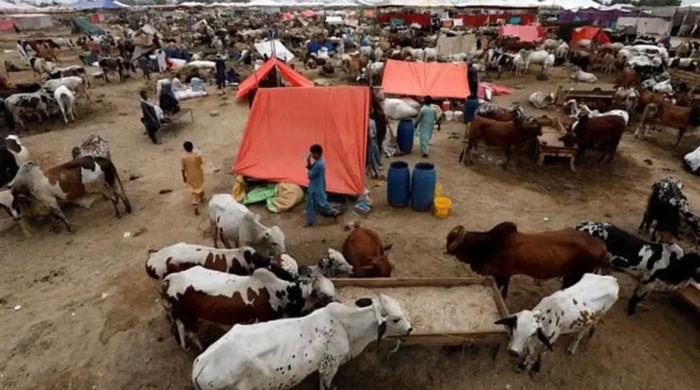PTI to work for prosperity of Pakistan's farmers, says Firdous Ashiq Awan
Awan says PML-N leaders made "Jati Umrah its centre of attention" and ignored agricultural sector
February 16, 2021
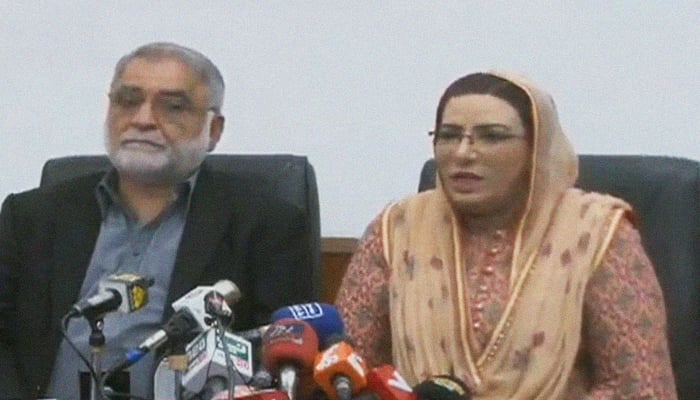
- Dr Firdous Ashiq Awan says PTI govt "is the guardian of the farmer's rights"
- Says Punjab's provincial irrigation minister took "revolutionary measures in line with his duties"
- Holds the "royal [Sharif] family" responsible for ignoring the agricultural sector and making "Jati Umrah its centre of attention"
ISLAMABAD: Punjab chief minister's aide on information Dr Firdous Ashiq Awan has said the ruling PTI would work for the prosperity of Pakistan's farmers.
In a press conference Tuesday afternoon, Dr Awan said the PTI government "is the guardian of the farmer's rights".
"It's not just the water running through rivers but also the blood of our farmers and smallholders that run Pakistan's economy and provide it oxygen through agricultural output," she maintained.
The CM's aide said the provincial irrigation minister took revolutionary measures in line with his duties.
"[During the tenure] of previous governments, the most important sector — agriculture — was ignored, which not only hurt the smallholders and farmers but also the barren land," she said. "As a result, the agricultural output turned out to be discouraging, with no prosperity for the farmers along with a dearth of digital technology."
Awan put the responsibility behind the lack of focus on the agriculture sector on the Sharif clan, saying that the "royal family made Jati Umrah its centre of attention".
The family, she added, deemed "the Jati Umrah state as the entire Pakistan or Punjab". However, she also spoke of the PTI regime's aims and efforts for the agricultural sector.
Read more: PDM is in disarray, says Firdous Ashiq Awan
The government would provide prosperity to the farmers, ensure water supply to the final stage, and turn barren farmlands into fertile ones for the oppressed farmers under the Leghari's leadership and Chief Minister Usman Buzdar's direction and vision — which is its "goal, obligation, and responsibility", she added.
Irrigation reforms
Speaking about the reforms, Punjab Irrigation Minister Muhammad Mohsin Khan Leghari said there were two kinds — brick-and-mortar efforts and policy initiatives — that led to long-term impacts for a department to operate better and eliminate its deficiencies and shortcomings.
The PTI government, he said, set up a water policy right after it came into power, under which the rules of usage and distribution of water — including irrigation, agriculture, drinking water, and industrial use — were laid down,
"The PTI introduced the Punjab Water Act, 2019, and no other province has such a law. We also set up a body in collaboration with the Punjab Khal Panchayat Authority, under which farmers and cultivators will be taken on board for input and suggestions on running the affairs of river streams.
"We also created a policy — which is in its approval stages — for the modification of command areas. For example, Lahore's Defence Housing Authority (DHA) area is agricultural land but there's a colony built there now. So we can now transfer the water to newer areas as the old law didn't have space for this," he said.
The provincial minister underlined that the PTI regime has been addressing the damages due to settlements near rivers and the water streams changing their courses, so it should be "according to policy and standards, not on whims".
Leghari underscored that the Canal & Drainage Act, 1873, was not in line with the demands of 2021, so the government had rewritten it and would introduce it very soon. "It's in the vetting stage right now," he said.
He noted that the green belts on the side of canals and rivers had been cut down and ignored over time, which was why the PTI regime would bring a policy to fix it.
"We can form partnerships with the neighbouring feudal and landlords as they will be our partners in profits and losses. They can take care and regrow the trees; that will help strengthen the embankments and bolster greenery.
"There's also an issue of a lack of performance measurement. Over time, everyone gets promoted. We're introducing a performance evaluation system for that. Developed countries and successful companies reward those who perform well and question those who don't," he said, adding that the new performance-based system will have targets related to command areas for employees which will work in line with the 'reward and punishment' concept.
The minister explained that another initiative, the digitisation of the abiana, or irrigated water tax collection, in its final stages and being introduced in four zones.
"It will be similar to the electricity and telephone bills," he said.
"At the moment, a landlord pays and gets a katchi parchi [unofficial receipt] so there are no records with us [the department] or them. Our system would bring an improvement in bookkeeping and adjustment to the inefficiencies of collection."
Leghari further underlined that the Punjab government would introduce a system for contractors to eliminate pooling related to the Public Procurement Regulatory Authority (PPRA) rules. The bidding, he added, would be done through software.
"Top officers are always working on postings and transfers so the newly-transferred ones do not get the time to understand the canals and then leave soon.
"Canals and rivers are like living organisms and each has different behaviours and circumstances. We're now bringing an automatic, system-generated transfer policy under which officers would work on everything, including the canal tail, barrage, drainage, and the small dams, as well as in offices so that they can be groomed on how the system works.
"Moreover, we will be installing a real-time water-flow monitoring system. This has already done on main barrages and will slowly be brought to the distribution system as well," the minister concluded.




